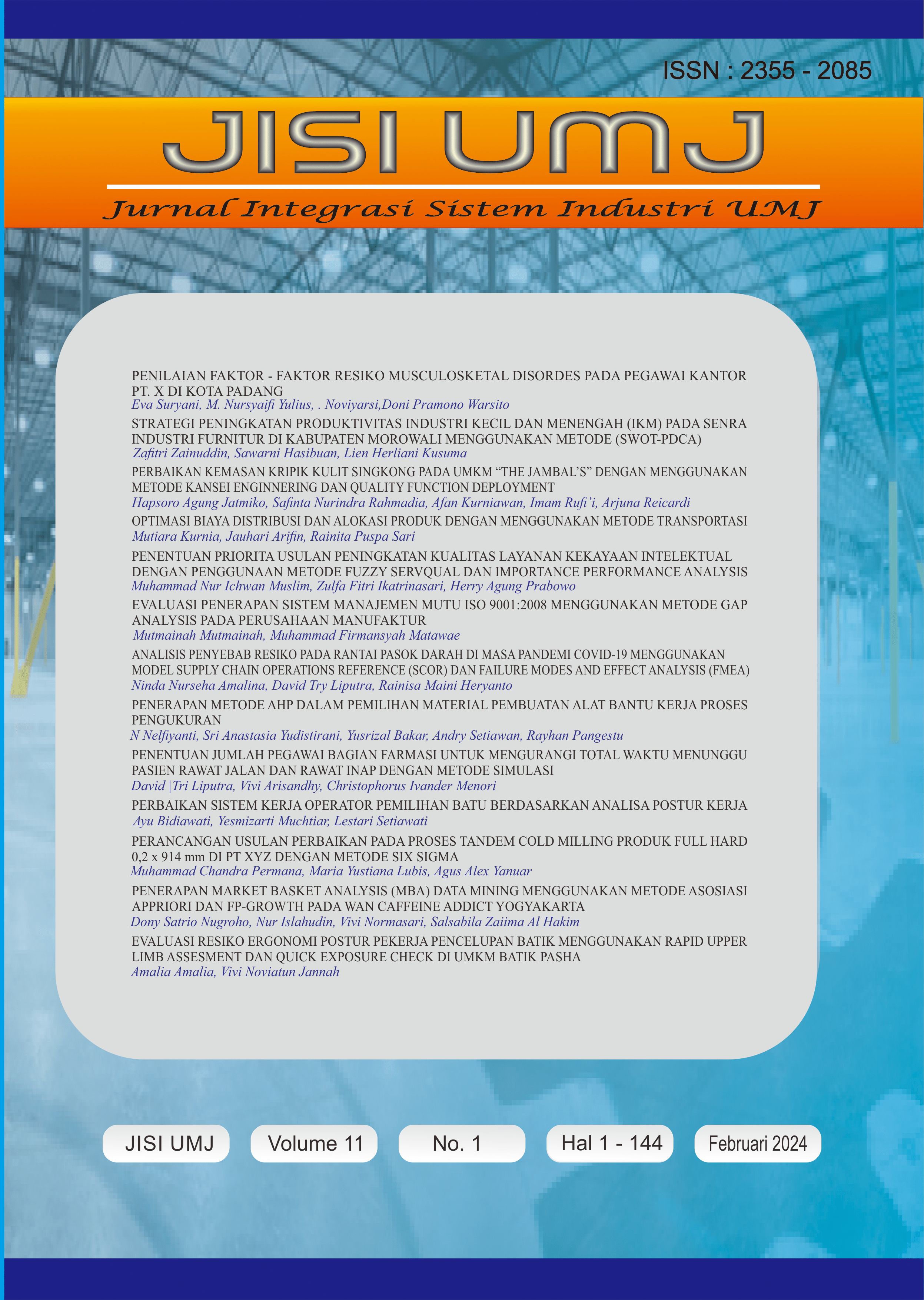PENERAPAN MARKET BASKET ANALYSIS (MBA) DATA MINING MENGGUNAKAN METODE ASOSIASI APPRIORI DAN FP-GROWTH PADA WAN CAFFEINE ADDICT YOGYAKARTA
DOI:
https://doi.org/10.24853/jisi.11.1.121-134Keywords:
Data Mining, Asosiasi, Apriori, Fp-Growth, Coffe Shop, Wan Caffeine AddictAbstract
Banyaknya coffe shop baru yang bermunculan setiap tahunnya, membuat para pelaku usaha coffe shop harus berinovasi dan menyediakan produk yang sesuai dengan preferensi konsumen, dimana salah satu preferensi konsumen adalah adanya paket produk serta diskon terhadap produk tertentu. Dengan penerapan teknologi informasi memiliki peran penting di dalamnya pemilik bisnis coffe shop, yaitu memudahkan pemilik bisnis dalam melakukan rekapitulasi dan pengolahan data yang akan membantu pemilik bisnis kafe mengambil keputusan yang berkaitan dengan peningkatan bisnisnya. salah satu metode yang digunakan untuk pengambilan keputusan adalah data mining Asosiasi. Asosiasi dapat digunakan untuk mencari keterkaitan antar produk sehingga mampu meningkatkan minat beli konsumen dengan cara bundling dan penetapan diskon terhadap pembelian produk-produk yang saling terkait. Wan Caffeine Addict yang merupakan sebuah coffe shop di Yogyakarta memiliki 684 transaksi dan 50 jenis produk terjual pada bulan desember 2022. Menggunakan metode asosiasi apriori dan FP-growth dengan tingkat support 3% dan confidence 10% diperoleh produk yang paling berkaitan adalah produk Flavored Latte Hazelnut Large dengan produk Wannabe dengan tingkat confidence 0.7 atau 70% dan lift ratio 3.84.References
Agrawal, Rakesh, Tomasz Imieliński, and Arun Swami. 1993. “Mining Association Rules between Sets of Items in Large Databases.” 207–16. doi: 10.1145/170035.170072.
Anwar, Muchamad Taufiq, Hindriyanto Dwi Purnomo, Mega Novita, and Clara Hetty Primasari. 2020. “Implementasi Metode Asosiasi Apriori Untuk Mengetahui Pola Beli Konsumen Dan Rekomendasi Penempatan Produk Pada Swalayan Xyz.” Dinamik 25(1):29–38. doi: 10.35315/dinamik.v25i1.7747.
Ashari, Imam Ahmad, Anggit Wirasto, Deny Nugroho Triwibowo, and Purwono Purwono. 2022. “Implementasi Market Basket Analysis Dengan Algoritma Apriori Untuk Analisis Pendapatan Usaha Retail.” MATRIK : Jurnal Manajemen, Teknik Informatika Dan Rekayasa Komputer 21(3):701–9. doi: 10.30812/matrik.v21i3.1439.
Ernawati, Iin. 2018. “Data Mining Sebagai Salah Satu Solusi Strategi Bisnis.” Informatik : Jurnal Ilmu Komputer 14(1):9. doi: 10.52958/iftk.v14i1.367.
Kouahla, I., M. A. Yallese, S. Belhadi, K. Safi, and M. Nouioua. 2022. “Tool Vibration, Surface Roughness, Cutting Power, and Productivity Assessment Using RSM and GRA Approach during Machining of Inconel 718 with PVD-Coated Carbide Tool.” International Journal of Advanced Manufacturing Technology. doi: 10.1007/s00170-022-09988-2.
Larose, Daniel T., D. Ph, Chantal D. Larose, and D. Ph. 2012. “Solutions to Chapter 1.” Algebra Through Practice 29–50. doi: 10.1017/cbo9781139168274.007.
Lestari, Ade Fitria, and M. Hafiz. 2020. “Penerapan Algoritma Apriori Pada Data Penjualan Barbar Warehouse.” INOVTEK Polbeng - Seri Informatika 5(1):96. doi: 10.35314/isi.v5i1.1317.
Lourenco, J., and A. S. Varde. 2020. “Item-Based Collaborative Filtering and Association Rules for a Baseline Recommender in E-Commerce.” Pp. 4636–45 in 2020 IEEE International Conference on Big Data (Big Data).
Rhomadhona, Herfia, Winda Aprianti, and Jaka Permadi. 2021. “Penerapan Data Mining Terhadap Data Penjualan Prioduk Kopi Menggunakan Algoritma Apriori.” Jurnal Sustainable: Jurnal Hasil Penelitian Dan Industri Terapan 10(2):65–73. doi: 10.31629/sustainable.v10i2.3792.
Rizkiyanto, Hendra. 2020. Implementasi Algoritma Apriori Untuk Menganalisa Transaksi Pakaian Di Toko Sahabat Busana Besuki.
Saefudin, Saefudin, and Septian DN. 2019. “Penerapan Data Mining Dengan Metode Algoritma Apriori Untuk Menentukan Pola Pembelian Ikan.” JSiI (Jurnal Sistem Informasi) 6(2):36. doi: 10.30656/jsii.v6i2.1587.
Safii, M., and Alrizca Trydillah. 2019. “METHOMIKA: Jurnal Manajemen Informatika & Komputerisasi Akuntansi IMPLEMENTASI DATA MINING DALAM MENENTUKAN POLA PEMBELIAN OBAT DENGAN METODE ALGORITMA APRIORI.” METHOMIKA: Jurnal Manajemen Informatika & Komputerisasi Akuntansi 3(1):66.
Wahyuni, Siti Tri. 2017. “Implementasi Data Mining Algoritma Apriori Pada Sistem Penjualan Roti Di Difa Rien’s Bakery.” 53(9):1689–99.
Widiastuti, Dwi, and Nelly Sofi. 2014. “Analisis Perbandingan Algoritma Apriori Dan Fp-Growth Pada Transaksi Koperasi.” UG Jurnal Vol. 8(01):21–24.
Yulianton, Heribertus. 2008. “Data Mining Untuk Dunia Bisnis Keputusan Informasi.” Jurnal Teknologi Informasi DINAMIK XIII(1):9–15.
Downloads
Published
Issue
Section
License
COPYRIGHT POLICY
The author(s) of an article published in the JISI UMJ retains ownership of the intellectual property rights in work (s).
PUBLISHING RIGHTS
The author(s) of an article published in the JISI UMJ have unrestricted publication rights. The authors give the JISI UMJ the right to publish the article and designate the Industrial of Engineering Universitas Muhammadiyah Jakarta Publishing as the original publisher of the article.
LICENSING POLICY
Journal of Industrial Engineering and Sciences is an open-access journal that follows the Creative Commons Non-Commercial 4.0 International License (CC BY-NC 4.0), which states that:

Under this license, the reusers must give appropriate credit, provide a link to the license, and indicate if changes were made. Users may do so in any reasonable manner, but not in any way that suggests the licensor endorses users or their use.
Please take the time to read the whole license agreement (https://creativecommons.org/licenses/by-nc/4.0/). As long as reusers follow the license conditions, the owner cannot withdraw these freedoms. The following components are included under this license:
 Attribution: Users must provide appropriate attribution, including a link to the license, and indicate whether or not they made any modifications. Users are free to do so reasonably, but not in a manner that indicates the licensee approves of their usage.
Attribution: Users must provide appropriate attribution, including a link to the license, and indicate whether or not they made any modifications. Users are free to do so reasonably, but not in a manner that indicates the licensee approves of their usage.
 NonCommercial: Users may not use the material for commercial purposes.
NonCommercial: Users may not use the material for commercial purposes.





